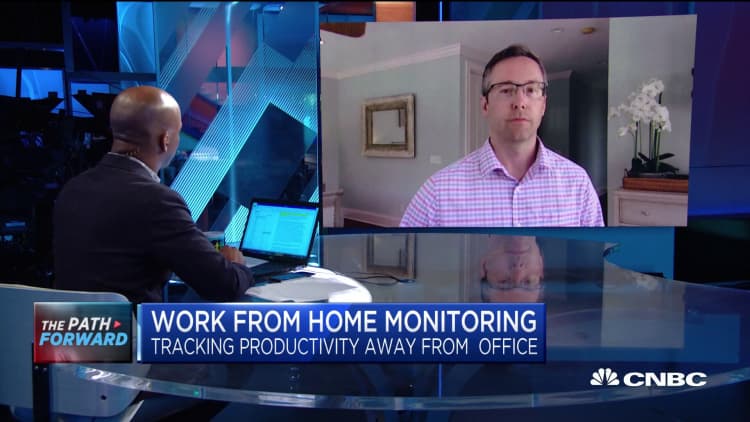After months of working from home, does the idea of resuming your commute and sitting in an office all day fill you with dread?
If you answered yes, this story is for you.
Prior to the pandemic, just 14% of employees in the U.S. worked from home five days a week. Now, as offices around the country remain shut down to stop the spread of the coronavirus, that share has swelled to more than 60%. Most of these newly remote employees give a thumbs-up to the change, with 3 in 5 saying they don't want to return to the old days, according to a Gallup survey.
Want to make the case to your boss that you don't need to return to your desk?
More from Personal Finance:
This is the average coronavirus stimulus payment in your state
College-bound students to miss out on billions in financial aid
Here are the top 10 cities for summer staycations
First off, knowledge is power. Find out if your employer has taken a stance on the subject, said Deborah Kolb, author of Negotiating at Work: Turn Small Wins Into Big Gains.
"Why put yourself out there until you know if there's a policy or not?" Kolb said.
Facebook announced recently that it was flipping tens of thousands of its jobs into remote positions. Twitter has also offered its employees the option to return, or not, as they so desire.
Some employers, including Zillow, have said workers don't have to return until 2021. Other companies, meanwhile, are diligently planning to bring their staff back in the post-Covid world. And some CEOs' negative views on working from home might be hard to change. In 2014, Yahoo CEO Marissa Mayer banned remote work, saying that it crippled innovation and collaboration.

"Having your ear to the ground is important," Kolb said.
Ideally, once you learn about your employer's thinking on the matter, you can build counterarguments to any concerns they might have, she said.
"Think about where the resistance is," Kolb said, adding that you want to understand your boss's "five good reasons for saying no."
Maybe they're worried you'll goof off in the day, or that communication between co-workers will suffer.
What are the other ways to have collaboration besides everyone being in the office?Deborah Kolbauthor of Negotiating at Work: Turn Small Wins Into Big Gains
"'Let's come up with some criteria for what productivity means,'" Kolb recommended saying to your boss. "Does it mean I write a report?
"What are the other ways to have collaboration besides everyone being in the office?" she added. "Does it mean we have a Zoom meeting with the team every day?" If your boss is worried you'll neglect tasks, you can offer to show him or her your schedule, Kolb said.
Women may face extra barriers in getting the go-ahead from their boss to work from home, said Hannah Riley Bowles, a negotiation expert at the Harvard Kennedy School.
"They may think it's more likely she's going to be conflicted between her care-giving opportunities and employment," Riley Bowles said. "You have to watch out that you're not stigmatized."
Address this concern head on, she said, by explaining how you plan to multitask.
"When things are less clear, people are more likely to rely on preconceived notions," Riley Bowles said.
Some companies are likely to develop specific remote work options for older employees and those with health conditions, Riley Bowles said. Before you even approach your manager, you might want to have a conversation with someone in human resources about this. "Then what you're asking for is a standard accommodation, and the argument you're making is why it should apply to you," she said.
In talking to your boss, be careful that your arguments aren't framed only around what's best for you, Riley Bowles added.
You want to focus on the information that will be the most persuasive with the person you're negotiating.Hannah Riley Bowlesnegotiation expert at the Harvard Kennedy School
"I wouldn't just focus on your needs and your problems," she said. "You want to focus on the information that will be the most persuasive with the person you're negotiating with."
Maybe you work more hours in the day without a commute, for example, or are more likely to follow through on creative ideas without office disruptions. If your company is trying to reduce its office space, this might be another good point to bring up.
In other words: Make the case of why you working from home is good for your company, not just you.
Another good negotiating tactic, particularly if your boss seems skittish about remote work, is to suggest that you work from home on a trial basis — say, for three months. If your boss is unhappy with the results in the end, you can tell him or her, you'll return.
"In negotiations, experiments and pilots are great," Kolb said. "It gives people an opportunity to revisit it, and in my experience, they never do."
It can also be helpful to think about what you want in a flexible way, "so it's not, 'yes' or 'no,' but 'A' or 'B,'" Kolb said. If your boss is resistant to the idea of you working from home full-time, for example, you may want to ask if you could do so three days a week.
Still hitting a wall?
Weigh how important your specific job is to you versus your ability to work from home. "You need to think about whether you want to stay," Kolb said.


